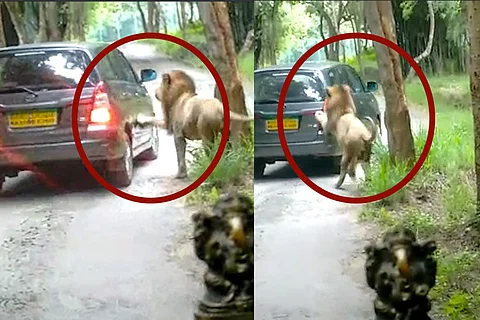

Bannerghatta National Park is the perfect little getaway for children in Bengaluru. Just 20kms away from the urban concrete jungle, Bannerghatta’s real jungle with fresh air, green landscape, and lions, tigers and bears offers a refreshing respite.
At the Bannerghatta Biological Park, which is a part of the national park, visitors are allowed to go on a safari. But when families are served with a long weekend, Bharat Bandh Friday to Ganesha Chaturthi Monday, the bus safaris look like mofussil services. The queues were long and with four fidgety kids tugging along, we chose to go for the more expensive 8-seater and 6-seater vehicles, not the bus safari.
The two cars, a Toyota Innova and a Mahindra Xylo, did not have any safety grills. They did have reassuring drivers. “This is regular madam, don’t worry, nothing will happen,” one of our drivers said.
The lingering fear and caution is immediately taken over excitement as the cars go through elephants, deer and bears. Then came the lions’ zone.
The Innova, with four children and four adults, was driving ahead. Few of us, in the Xylo, took out our phone cameras to shoot the animals and the car ahead. Meanwhile, the driver at the Innova was cheerfully telling his ride, “Now you watch, they will crouch, and then come charging towards my car. They don’t like my car,” he said, as a matter of fact.
He was right, First, on the left, we saw a lion briskly walking towards the Innova. As the car cruised ahead, the lion crouched behind some shrubs, and just as the car was about to go past the lion, the lion charged at the car. The car screeched to a halt, and lion took off on the sides, scratching it. The car maneuvered and drove ahead. Within a couple of minutes, a lioness came from the right side, and stopped the SAME car again.

She waited for the lion to catch up, and soon, both the majestic cats were on either side of the car, blocking it. They blocked the car for a few seconds and then walked alongside it.

The lion charged again at the car, but by then the car sped away.
My friend and Director of Communications of Change.org Durga Nandini who was in the car with me captured most of this on camera.
As I shared a video on Twitter (which I later deleted as people started calling it a ‘deadly attack by lions’), many responded asking if we were fine. We were, and there was nothing deadly about the non-attack.
On a Whatsapp group, two other parents recounted their own run-ins with the lions - and both times it was the Innova.
“It isn’t normal if an animal targets the same vehicle or any vehicles repeatedly. Animals cannot distinguish colors and so they go by shapes. If that’s the case, then the park authorities should take this into account and try study what’s disturbing the animals. They should take corrective measures,” Sanjay Gubbi, conservationist and wildlife expert told me later.
Santhosh Kumar, Executive Director of the Bannerghatta National Park says this is not the first time he was hearing this, “I got a complaint about the Innova last week too. When I enquired I was told that this excites tourists and some of them are demanding for the car.”
It may be fun for some tourists, but what if something tragic happened? “Yes, we don’t want to take any chances. I am removing the Innova from the safari,” Kumar assured me.
But what he said next flipped my perspective, “Visitors may have fun as the lions’ charge and pounce, but we cannot fathom how much it must be stressing the animals out.”
It isn’t just our safety that should concern us. A biological park is created in an animal zone and continuous entry of humans in vehicles is allowed, and what should worry us is the damage the speeding cars can cause to the animals.
Not just for our own safety, but for the sake of the animals, perhaps we need to be more circumspect about how we step into their habitat, if at all we have to.